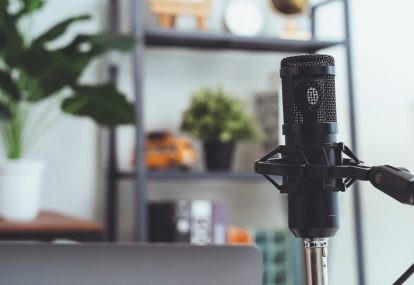The world of podcasting is essentially comprised of two broad groups of people. The first group are the podcast superstars like Jon Nastor of “Hack the Entrepreneur,” Michael Hyatt of “This is Your Life,” Amy Porterfield of “Online Marketing Made Easy,” and Michael Stelzner of “Social Media Marketing Podcast.” The second group is pretty much, well, everyone else.
Needless to say, it’s the dream of every podcaster to make that transition from someone struggling to someone considered an authority in the industry.
It’s easier said than done, true. However, while making the transition from podcast newbie to podcast superstar can be challenging, it can be done.
While a lot of factors are involved in the success of a podcast, having a podcast routine is deemed one of the essentials.
Importance of Having a Podcast Routine
In one episode of ”The Showrunner Podcast,” Jon Nastor pointed out one thing that Pat Flynn—owner of the widely respected blog and podcast titled “The Smart Passive Income”—shared to him about podcasting. Pat shared that one thing he wished he could have done during his first year as a podcaster was staying consistent.
Not everyone may be aware of it but consistency is crucial in the volatile and competitive world of podcasting. With competition very high, it can be very easy for subscribers and listeners to be enticed to listen to other podcasts. In some cases, getting old listeners back can become as challenging as getting new ones.
That being said, the importance of keeping a podcasting routine cannot be overemphasized. With a routine in place, it becomes much easier for you to produce quality episodes and churn them out on a consistent basis.
Why is It So Difficult?
Creating a podcast routine especially if you’re just starting out is not a new concept. In fact, it is considered one of the basics many podcasting greats advocate. However, the question remain–why aren’t many people doing it?
While the answer can vary, often times, it can be because some podcasters make their routines so rigid that it becomes too overwhelming for them to adhere to. However, if anything, a podcasting routine does not have to be overwhelming. In fact, many podcasting elites share simple and straightforward ones often get the job done.
If this is something you currently struggle with, the following tips can get you off to a good start:
Start with the right mindset
Jerod Morris of “The Showrunner Podcast” shared that what separates successful podcasters from those that are struggling is the mindset.
There are basically two kinds of mindsets. He named the first one the selfish mindset.
Podcasters who have the selfish mindset podcast for themselves and their benefit. Basically, their main focus is figuring out what they can get from every podcast they put out. They pick topics based on what excites them as opposed to what excites their listeners. And since they only focus on what they can get, it’s easy for them not to remain consistent especially when they don’t see the results they are looking for.
The second mindset is something many successful podcasters share. Morris refers to this mindset as the selfless mindset.
As you may have probably guessed, this mindset is the complete opposite of the first. Podcasters with this mindset always approach their podcast routine with the question “How can I help someone else today?”
Podcasters with a selfless mindset don’t mind putting something of value but not getting anything in return. Primarily, they just want listeners to learn something valuable from their podcasts. When it comes to the topics they tackle, podcasters with the selfless mindset prefer discussing topics listeners would love and get invaluable insights from. In essence, how the listeners can benefit from the podcast is their main priority.
Podcasters with the selfless mindset also do more than just churn out content. They also go the extra mile by answering questions listeners ask and taking note of topic suggestions given to them.
Once you are able to effectively connect with your audience, you are also more likely to earn their trust and loyalty. As a podcaster, this can benefit you in more ways than you can possibly imagine. As Michael Hyatt shared, “Anything that you sell, you have a better chance of selling if they know that they can trust you.”
Know Your Type of Podcast
Jon Nastor maintains there are generally two types of podcasts: podcasts for personal branding and podcasts for business.
Podcast for Personal Branding
As the name suggests, this type of podcast centers on topics and episodes that are meant to help you become an authority in your niche. At the same time, it is also used to build a decent following and generate leads.
Podcasts of this nature often emphasize their unique selling proposition. In other words, their primary focus is showing their listeners their unique voice and the qualities that makes them stand out from other podcasters in the same niche.
Podcast for Business
This type of podcast is usually created by businesses that already have an audience on another platform (usually a website or blog). Aside from providing additional content to attract a totally different set of audience, podcasts that fall under this category help businesses develop a connection with both new and existing followers.
“The Showrunner” podcast is a good example of this. Another is the “Business Reimagined” podcast by Danny Inny, owner of Mirasee, formerly known as Firepole Marketing.
One of the biggest mistakes podcasts of this nature commit include repurposing old content and focusing mainly on marketing. While this is not exactly a bad thing, it can be when connecting with the audience is totally forgotten. In essence, your business podcast should be able to provide a personality and a face and help you effectively establish a connection with the people you are targeting.
Set Realistic Goals
As mentioned earlier, running a podcast will require time and effort. If you want to build a loyal following, you need to be willing to give your 100% in each and every episode. More importantly, you need to be able to churn out podcast episodes on a consistent basis.
Make no mistake about it though, being consistent does not necessarily entail releasing an episode daily. Jon Nastor only uploads a brand new episode three times a week while Amy Porterfield of the Online Marketing Made Easy only releases one podcast episode per week.
What’s key however is ensuring you deliver podcast episodes right on schedule. Figure out the realistic number of episodes you can manage in a week without neglecting your personal life and other things you deem important.
What’s your podcasting routine like? Does it work for you? Sound off in the comments below!
Share this post!




